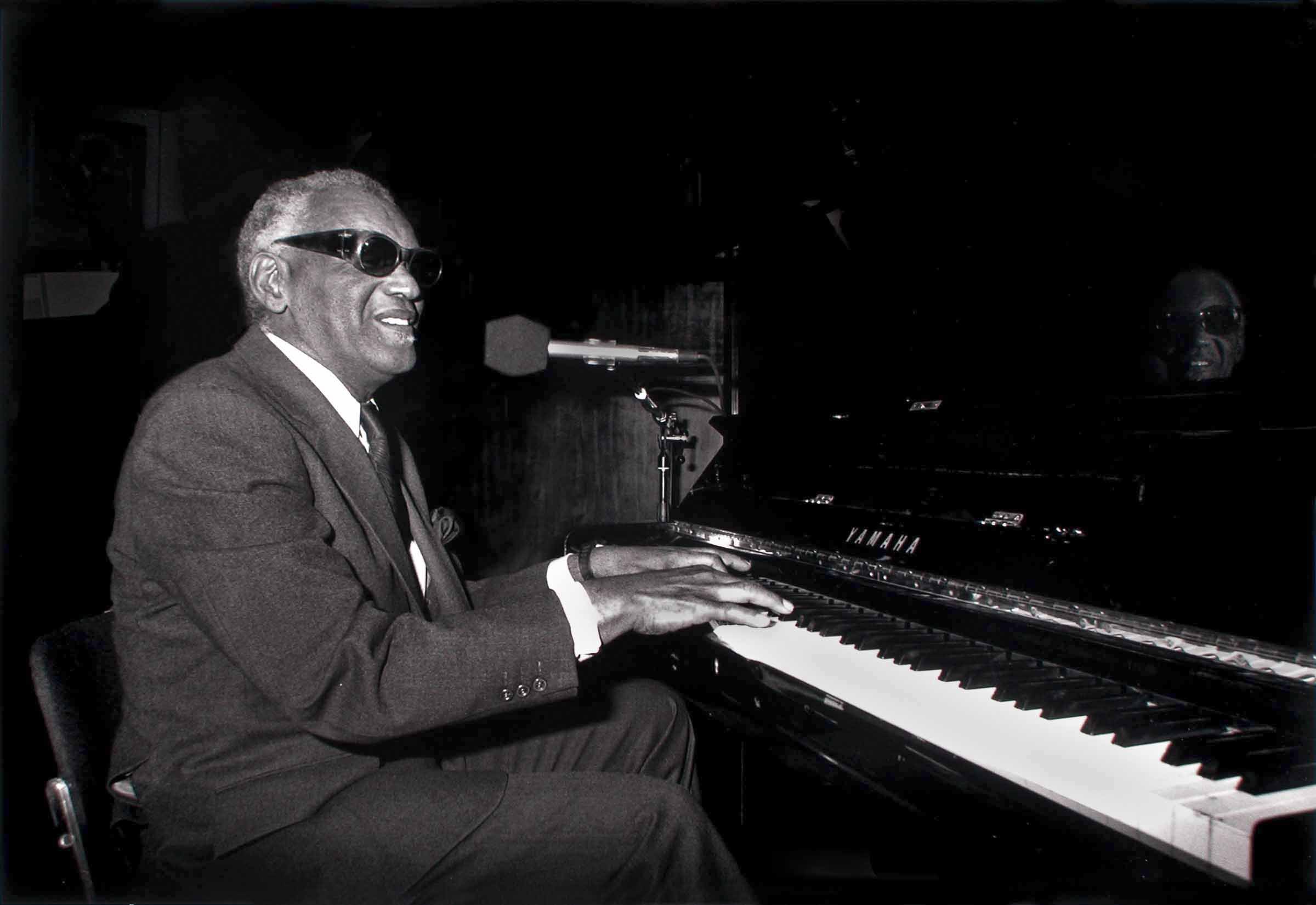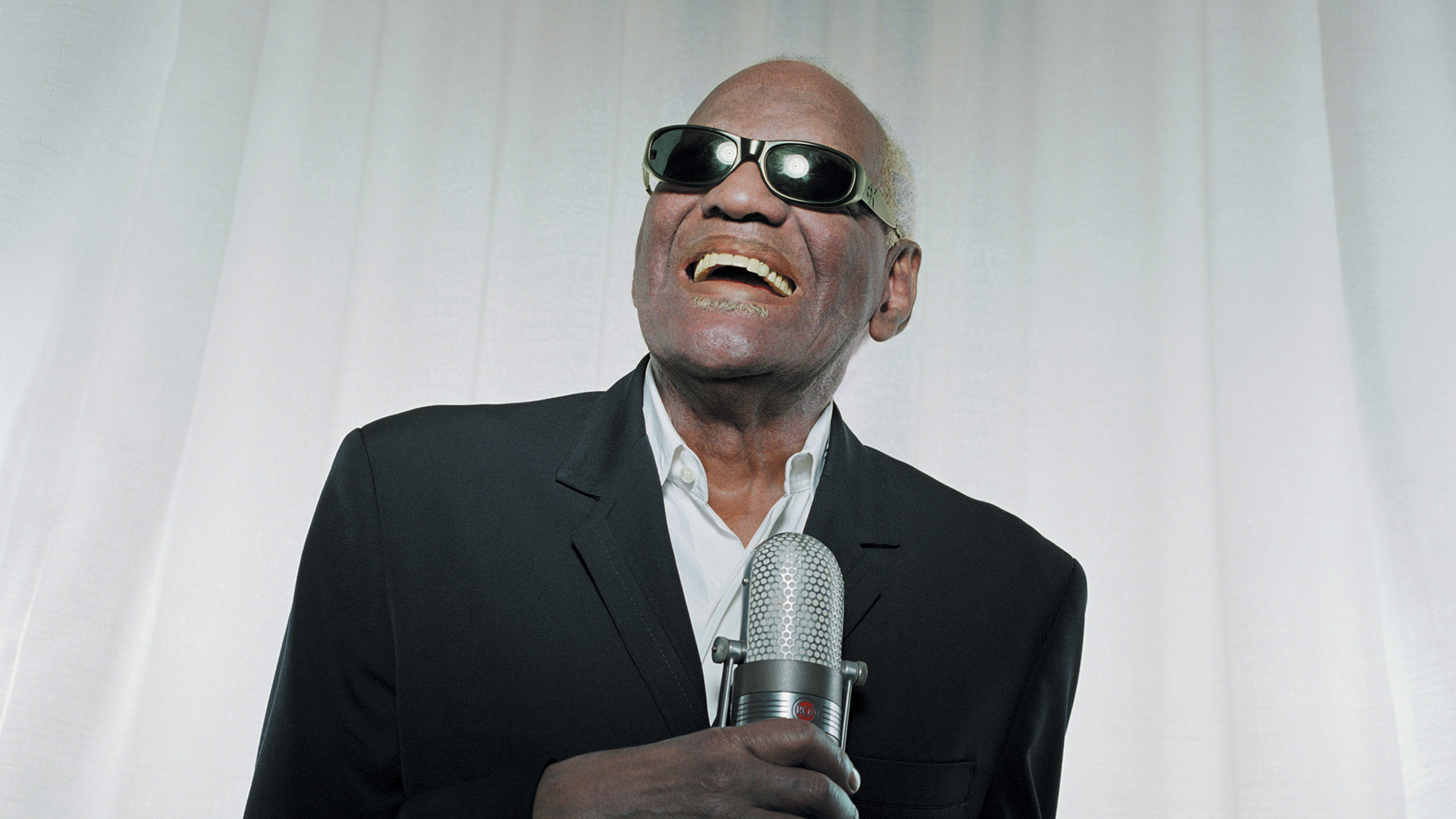So here's the deal, folks. If you've ever found yourself tapping your feet to a soulful tune or feeling the raw emotion in a song, chances are Ray Charles had something to do with it. This man didn't just sing; he redefined music as we know it. His voice? Pure magic. His style? A blend of gospel, blues, and jazz that left everyone speechless. And guess what? We're diving deep into the life, career, and legacy of Ray Charles today. So buckle up!
You might be thinking, "Why should I care about Ray Charles?" Well, let me tell you, this guy wasn't just another musician. He was a trailblazer, a pioneer, and a force to be reckoned with. In an era where segregation was still a thing, Ray Charles broke barriers and brought people together through his music. His ability to blend different genres into something entirely new was unmatched. And that's exactly why we're here—because his story is worth telling, and his music is timeless.
Now, before we dive into the nitty-gritty, let's set the stage. Ray Charles wasn't just a singer; he was a composer, a bandleader, and an activist. His journey from a small town in Georgia to becoming one of the most iconic figures in music history is nothing short of inspiring. So whether you're a die-hard fan or just curious about the man behind the music, this article has got you covered. Let's get started!
Read also:Talisua Fuavaifatu The Ultimate Guide To Discovering This Hidden Gem
Biography of Ray Charles: A Journey Through Time
Alright, let's talk about the man himself. Ray Charles Robinson was born on September 23, 1930, in Albany, Georgia. His early life wasn't easy—his family struggled financially, and tragedy struck when he lost his younger brother in a drowning accident. But it was music that became his solace. By the age of five, Ray was already showing a keen interest in the piano, and by the time he was seven, he had lost his sight completely due to glaucoma. Yet, this didn't stop him from pursuing his dreams.
Here's a quick look at his early life:
| Fact | Details |
|---|---|
| Full Name | Ray Charles Robinson |
| Date of Birth | September 23, 1930 |
| Place of Birth | Albany, Georgia |
| Year Lost Sight | 1937 |
| Genre | Soul, R&B, Blues, Jazz |
Ray Charles didn't let his blindness define him. Instead, he used it as fuel to push boundaries and create music that resonated with millions. His journey from a small-town boy to a global icon is nothing short of remarkable.
Ray Charles and the Birth of Soul Music
Now, let's talk about the elephant in the room—soul music. Ray Charles is often credited as the "Father of Soul," and for good reason. In the late 1950s, he began experimenting with blending gospel, blues, and jazz, creating a sound that was both innovative and deeply emotional. His hit "What'd I Say" became a defining moment in music history, showcasing his ability to connect with audiences on a visceral level.
Here are some key points about Ray Charles and soul music:
- Released "What'd I Say" in 1959, which became a massive hit
- Blended gospel, blues, and jazz to create a unique sound
- Influenced countless artists across genres
Ray Charles wasn't just creating music; he was creating a movement. His ability to bring people together through his art was unparalleled, and his influence can still be felt today in modern music.
Read also:Wentworth Miller Wife The Untold Story Behind The Headlines
Ray Charles' Musical Style: A Blend of Genres
So, what exactly made Ray Charles' music so special? It was his ability to seamlessly blend different genres into something entirely new. He took elements from gospel, blues, jazz, and even country, creating a sound that was both familiar and groundbreaking. His voice? Pure gold. His piano skills? Legendary. And his ability to convey emotion through music? Unmatched.
Key Elements of Ray Charles' Style
Here are some of the key elements that defined Ray Charles' musical style:
- Powerful vocal delivery
- Masterful piano playing
- Emotional depth in his performances
- Innovative blending of genres
Ray Charles wasn't afraid to experiment, and that's what made his music so special. He pushed boundaries and broke barriers, paving the way for future artists to do the same.
The Impact of Ray Charles on the Music Industry
Now, let's talk about the impact Ray Charles had on the music industry. In an era where segregation was still a reality, Ray Charles used his platform to promote equality and unity. He refused to perform in venues that practiced racial segregation, setting a precedent for other artists to follow. His activism extended beyond the stage, as he became a vocal advocate for civil rights.
Here are some ways Ray Charles impacted the music industry:
- Challenged racial segregation in venues
- Set a standard for artistic integrity
- Influenced countless musicians across genres
Ray Charles wasn't just a musician; he was a trailblazer who used his art to make a difference. His legacy continues to inspire artists and activists alike.
Ray Charles' Most Iconic Songs
Let's talk about the music, shall we? Ray Charles had a string of hits throughout his career, but some songs truly stood out. From the soulful "Georgia on My Mind" to the upbeat "What'd I Say," his music resonated with audiences across the globe. Here are some of his most iconic songs:
- "Georgia on My Mind" – A soulful ballad that became Georgia's official state song
- "What'd I Say" – A groundbreaking hit that defined soul music
- "Hit the Road Jack" – A funky tune that showcased his vocal prowess
- "I Can't Stop Loving You" – A heartfelt ballad that touched millions
Each of these songs tells a story, and Ray Charles' ability to convey emotion through his music is what made him so special.
Ray Charles and the Civil Rights Movement
Now, let's talk about Ray Charles' role in the civil rights movement. In a time where racial segregation was still a reality, Ray Charles used his platform to promote equality and justice. He refused to perform in venues that practiced segregation, and his activism extended beyond the stage. He became a vocal advocate for civil rights, using his music to bring people together.
Here are some key moments in Ray Charles' civil rights activism:
- Refused to perform at segregated venues
- Supported the civil rights movement through his music
- Set a precedent for other artists to follow
Ray Charles wasn't just a musician; he was a force for change. His activism and advocacy continue to inspire people to this day.
Ray Charles' Legacy: A Lasting Impact
So, what is Ray Charles' legacy? Simply put, it's immense. His influence can still be felt in modern music, and his contributions to the music industry and civil rights movement are unparalleled. He broke barriers, challenged norms, and created music that continues to resonate with audiences across generations.
Here are some ways Ray Charles' legacy lives on:
- Influence on modern musicians
- Advocacy for civil rights
- Legacy of innovation in music
Ray Charles wasn't just a musician; he was a cultural icon whose impact will be felt for generations to come.
Ray Charles and Modern Music: The Influence Continues
Fast forward to today, and Ray Charles' influence can still be seen in modern music. Artists across genres continue to draw inspiration from his innovative approach to blending genres and his ability to convey emotion through music. From soul to R&B to jazz, Ray Charles' legacy lives on in the music of today's artists.
Modern Artists Inspired by Ray Charles
Here are some modern artists who have been inspired by Ray Charles:
- Stevie Wonder
- Aretha Franklin
- Sam Cooke
- John Legend
Ray Charles' influence extends far beyond his own era, proving that true artistry transcends time.
Ray Charles' Personal Life: Beyond the Music
Now, let's talk about Ray Charles' personal life. Beyond the music, Ray was a complex individual with a rich personal history. He faced numerous challenges throughout his life, from his battle with drug addiction to his tumultuous relationships. Yet, through it all, he remained a force to be reckoned with, both in his personal and professional life.
Here are some key moments in Ray Charles' personal life:
- Struggled with drug addiction in the 1960s
- Overcame addiction and became a vocal advocate for recovery
- Had a complex family life, with multiple marriages and children
Ray Charles' personal life was as fascinating as his music, and his ability to overcome challenges only adds to his legacy as a true icon.
Conclusion: The Timeless Legacy of Ray Charles
So there you have it, folks. Ray Charles wasn't just a musician; he was a cultural icon whose impact continues to be felt today. From his innovative approach to blending genres to his activism for civil rights, Ray Charles left an indelible mark on the world. His music continues to inspire and move people across generations, proving that true artistry transcends time.
Here's a quick recap of what we've covered:
- Ray Charles' early life and rise to fame
- His role in the birth of soul music
- His impact on the music industry and civil rights movement
- His legacy and influence on modern music
So, what do you think? Did we miss anything? Let us know in the comments below. And if you enjoyed this article, be sure to share it with your friends and family. Together, let's keep the legacy of Ray Charles alive for generations to come!
Table of Contents


